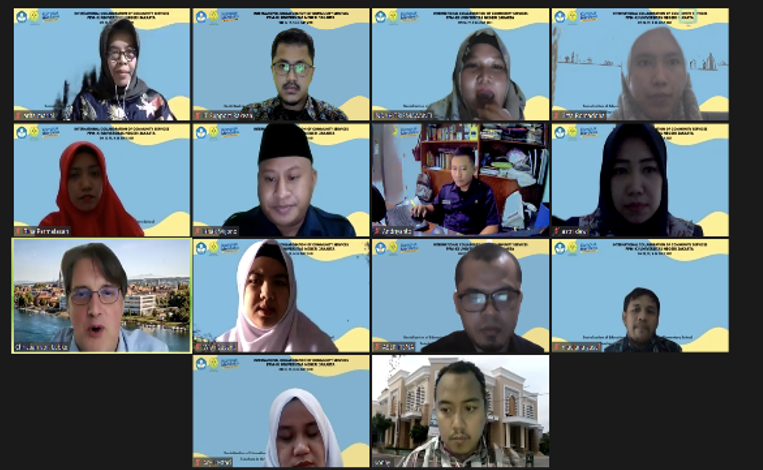Empowering entrepreneurship competences through socialization of educational entrepreneurship for elementary school teachers in Jakarta
DOI:
https://doi.org/10.22219/jcse.v3i1.18144Keywords:
Educational entrepreneurship , Entrepreneurial interest , Entrepreneurship competencesAbstract
Partner of this international collaboration of community service is Konstanz University of Applied Sciences in Germany, Prof. Dr. Christian von Lübke, to be invited to collaborate in giving socialization about educational entrepreneurship for elementary school teachers in the province of Jakarta Indonesia. The target of this community service is elementary school teachers in the Province of Jakarta Indonesia. The socialization of educational entrepreneurship for elementary school teachers was done to develop entrepreneurship competences of elementary school teachers in the Province of Jakarta Indonesia, the solution undertaken was socialization of educational entrepreneurship. The methods used in conducting this international collaboration of community service were cooperative learning, problem-based learning, and giving assignments. This socialization was conducted through video conferences in the form of learning activities to improve the competence in educational entrepreneurship for elementary school teachers in the province of Jakarta Indonesia. The socialization of educational entrepreneurship given is related to developing entrepreneurial interest with appropriate learning activity programs. This international collaboration of community service was conducted at elementary schools in the Province of Jakarta Indonesia because those elementary schools are regularly empowered by Universitas Negeri Jakarta. Based on evaluation measurement, teachers’ interest in entrepreneurship education reached 86,75 % and the average satisfaction level of participants were 94%.
Downloads
References
AACTE. (2010). 21st century knowledge and skills in educator preparation (Issue September). Pearson. https://files.eric.ed.gov/fulltext/ED519336.pdf
Abidah, A., Hidaayatullaah, H. N., Simamora, R. M., Fehabutar, D., & Mutakinati, L. (2020). The Impact of Covid-19 to Indonesian Education and Its Relation to the Philosophy of “Merdeka Belajar.” Studies in Philosophy of Science and Education, 1(1), 38–49. https://doi.org/10.46627/sipose.v1i1.9
Astuti, A. P., Aziz, A., Sumarti, S. S., & Bharati, D. A. L. (2019). Preparing 21st century teachers: Implementation of 4C character’s pre-service teacher through teaching practice. Journal of Physics: Conference Series, 1233(1), 12109. https://doi.org/10.1088/1742-6596/1233/1/012109
Boldureanu, G., Ionescu, A. M., Bercu, A. M., Bedrule-Grigoruţă, M. V., & Boldureanu, D. (2020). Entrepreneurship education through successful entrepreneurial models in higher education institutions. Sustainability (Switzerland), 12(3), 1–33. https://doi.org/10.3390/su12031267
Cárcamo-Solís, M. de L., Arroyo-López, M. del P., Alvarez-Castañón, L. del C., & García-López, E. (2017). Developing entrepreneurship in primary schools. The Mexican experience of “My first enterprise: Entrepreneurship by playing.” Teaching and Teacher Education, 64, 291–304. https://doi.org/https://doi.org/10.1016/j.tate.2017.02.013
Darling-Hammond, L., Flook, L., Cook-Harvey, C., Barron, B., & Osher, D. (2020). Implications for educational practice of the science of learning and development. Applied Developmental Science, 24(2), 97–140. https://doi.org/10.1080/10888691.2018.1537791
Dhawan, S. (2020). Online Learning: A Panacea in the Time of COVID-19 Crisis. Journal of Educational Technology Systems, 49(1), 5–22. https://doi.org/10.1177/0047239520934018
Hák, T., Janoušková, S., & Moldan, B. (2016). Sustainable Development Goals: A need for relevant indicators. Ecological Indicators, 60, 565–573. https://doi.org/10.1016/j.ecolind.2015.08.003
Haryani, E., Coben, W. W., Pleasants, B. A.-S., & Fetters, M. K. (2021). Analysis of teachers’ resources for integrating the skills of creativity and innovation, critical thinking and problem solving, collaboration, and communication in science classrooms. Jurnal Pendidikan IPA Indonesia, 10(1), 92–101. https://doi.org/10.15294/jpii.v10i1.27084
Lynch, M., Kamovich, U., Longva, K. K., & Steinert, M. (2021). Combining technology and entrepreneurial education through design thinking: Students’ reflections on the learning process. Technological Forecasting and Social Change, 164, 119689. https://doi.org/10.1016/j.techfore.2019.06.015
Malik, R. S. (2018). Educational challenges in 21St century and sustainable development. Journal of Sustainable Development Education and Research, 2(1), 10–20. https://doi.org/10.17509/jsder.v2i1.12266
Trust, T., Krutka, D. G., & Carpenter, J. P. (2016). “Together we are better”: Professional learning networks for teachers. Computers & Education, 102, 15–34. https://doi.org/10.1016/j.compedu.2016.06.007

Downloads
Published
How to Cite
Issue
Section
License
Copyright (c) 2022 Arita Marini, Desy Safitri, Ika Lestari, Musril Zahari, Rossi Iskandar, Ajat Sudrajat, Sri Nuraini, Taufik Rihatno, Yustia Suntari, Maratun Nafiah, Rosinar Siregar

This work is licensed under a Creative Commons Attribution-ShareAlike 4.0 International License.












